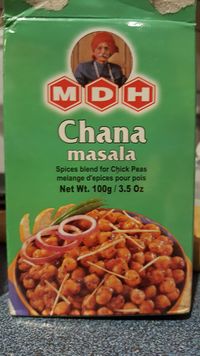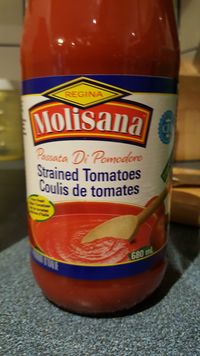Chana Masala
Overview
One of my wife's favourite dishes, I make this a lot.
I've done the spice by hand and that's nice but I'm a busy dad, I cheat when ever possible.
Ingredients
2 medium side onions chopped finely
2 tablespoons of Ghee
1.5 cups of passata ( Tomato )
Some water.
a table spoon of MDH Chana Masala spice powder ( see image below )
1/2 teaspoon of salt.
1 teaspoon of chopped ginger
1/2 teaspoon of baking soda
2 X 540ml cans of Chick peas
Steps
Chop onions finely, add ghee and onions to frying pan , and fly until onions are golden, medium to low heat.
Add salt and Chana Masala Powder, ginger, and Stir.
Add tomato Passata and some water ( 1/2 cup ), get up to temperature, simmering, stir occasionally.
Strain Chick Peas and add to the pan.
Add enough water to get to the saucieness level you want. Let that get up to temperature and let it simmer until the chick peas are as cooked as you like 10 mintues or 20 minutes, it depends on those chick peas. Different canners can yield chick peas that are harder or softer. Also if you do chick peas from dry ( having soaked them over night ), you might need to simmer for longer. Add water as needed.
The last step: adding the baking soda, which will foam up a bit and change the colour.
Optional Garnish: ginger cut to matchstick size, and or corriander to taste.
Notes and Commentary
you could use fresh tomatoes but I like the saucy smoothness of passata, which is just tomatoes with no skin or seeds. Passata is cheap when it's on sale at 99 cents. and is a great base for anything you want to do with tomatoes. Because it's not "sauce" it has no basil, or spices, so it's a clean slate.
The baking soda is to counter the acidity of the tomatoes, my wife likes it left out, you can decide for yourself. A neat side effect is that the baking soda turns the dish very dark.
I have included images of the products , including the box instructions below.
You can get away with vegetable oil or butter instead of ghee, but ghee has a certain flavour. Ghee is clarified butter, i.e. the fat part of the butter, no milk solids, and no water. You'd be surprised how much water there is in butter.


